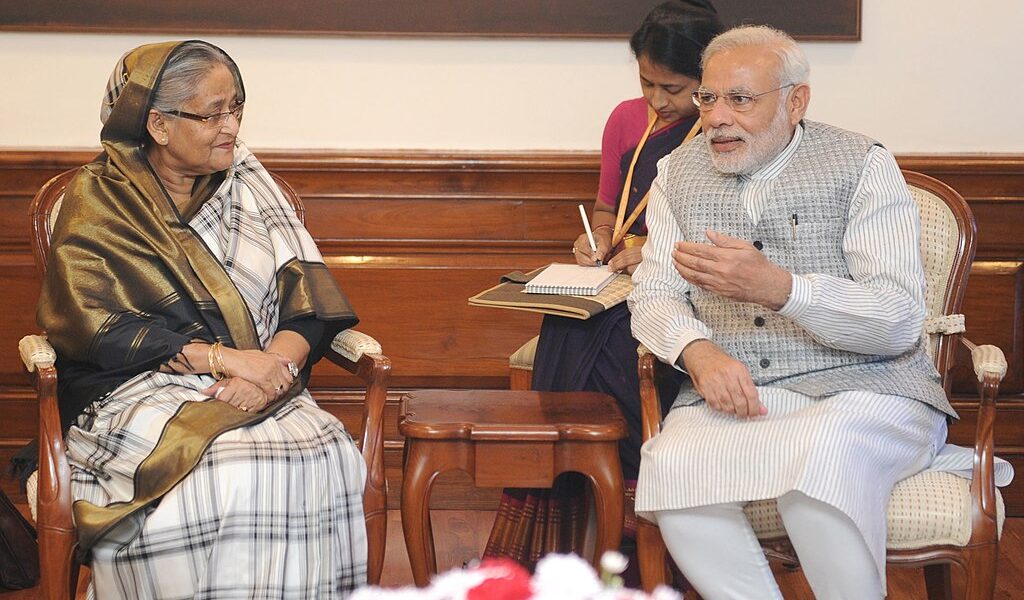Areeba Sherwani argues that the loss of Sheikh Hasina of Bangladesh will be a major blow to India’s geo-strategic rivalry with China.
The political landscape of Bangladesh has been dramatically reshaped by recent events, culminating in the resignation of Prime Minister Sheikh Hasina and the military takeover. Sheikh Hasina, daughter of Bangladesh’s founding president Sheikh Mujibur Rahman, was the world’s longest-serving female head of government. Her political journey began after her father’s assassination in a 1975 military coup. After living in exile in India, she returned to Bangladesh in 1981 and joined hands with other political parties to lead a popular uprising for democracy that made her a national icon. She led the Awami League and became a symbol of democratic resistance. First elected as Prime Minister in 1996, Hasina focused on economic reforms but lost to rival Begum Khaleda Zia in 2001. She returned to power in 2009 and ruled as an authoritarian for 15 years with her 4th consecutive term winning a contentious election in January 2024 which the opposition boycotted.
Her rise from political exile to political demise started with significant economic growth and infrastructure development but became marred by allegations of human rights abuses, including forced disappearances and extrajudicial killings of opposition leaders, activists and students who questioned her government.
Student Protests and Government Response
The roots of the current crisis lie in the job reservation system established in 1972, which allocated 30% of government jobs to the descendants of “freedom fighters” from Bangladesh’s war of independence. There was reservation of 56% in government jobs, out of this, 30% for the family members of the liberation warriors or freedom fighters, and 10% was reserved for women. There was another 10% for district wise quota, and a small percentage reserved for a few minorities and ethnic groups.
Over time, this system was criticized for creating an inequitable job market and fostering nepotism and loyalty to Sheikh Hasina’s administration .The High Court’s decision to reinstate the quota system in June 2023, after its abolition in 2018 due to widespread protests, reignited public outrage which was seen this year.
The government’s response was marked by increasing severity, police brutality, army deployment and barbarity of Chhatra League goons (student wing of Awaam League) on protesting students. Initial measures included a ban on internet services and restrictions on transportation to prevent the movement of protesters, shoot at sight orders which led to the death of 210 students as per Prothom Alo where as unofficial reports claim the death of over 1000 students. UN armoured tanks and helicopters were used on the students which is strictly prohibited outside UN mission. However, these actions failed to quell the unrest. The situation escalated dramatically on July 21, when the Supreme Court reduced the quota to 5%, a move that did little to placate the protesters.
The protests exposed deeper issues within Bangladeshi society. Economic discontent has been a significant driver, with high youth unemployment, rising inflation, and severe food insecurity affecting millions. According to the United Nations, over 37 million people in Bangladesh face moderate to severe food insecurity, and youth unemployment rates are alarmingly high.
Corruption and governance issues have further fueled public anger. The concentration of wealth among a small elite, widespread reports of official corruption, and the misuse of state institutions to suppress dissent eroded public trust in the government. The government’s heavy-handed response to protests, including the use of internet shutdowns and police violence, has exacerbated these grievances.
What began as student protests quickly escalated into a nationwide movement, reflecting deeper societal discontent with economic conditions, governance, and political freedom. The situation reached a critical point over the weekend when violent clashes between protesters and police resulted in significant casualties. At least 101 people were killed, and over 1,000 were injured on Sunday 4th of August. The violence and the subsequent storming of Prime Minister Hasina’s residence marked a turning point, prompting the military to intervene.
Army Chief General Waker-Uz-Zaman has announced the formation of an interim government and called for protesters to stand down. Hasina and her sister, Sheikh Rehana, fled to India, seeking refuge and potentially political asylum in London or Belarus as per the sources.
The unrest has also impacted Bangladesh’s foreign relations. Prime Minister Hasina’s government has faced longstanding accusations of authoritarianism and human rights abuses. The recent crackdown has intensified international scrutiny, potentially affecting Bangladesh’s diplomatic and economic relationships.
India’s Strategic Concerns and Future Prospects
Sheikh Hasina, has long been a crucial ally to India, particularly in countering anti-India terrorist groups operating from Bangladesh. This partnership significantly strengthened Indo-Bangladeshi relations, with New Delhi providing aid and assistance for various projects in Dhaka.
Their relationship has been pivotal for regional security, particularly concerning the seven landlocked northeastern states of India that share a border with Bangladesh. Hasina’s administration granted India transit rights, ensuring the smooth movement of goods from mainland India to these northeastern states.
By maintaining a cautious stance and insisting that the recent turmoil in Bangladesh was an internal matter, New Delhi extended tacit support to Hasina despite her undemocratic practices. Strong support for Hasina over the past decade led to minimal interaction with Bangladeshi opposition groups, leaving India in a challenging position now.
The Indian Government now faces a significant dilemma. By backing an increasingly unpopular ally, it risked alienating a broad-based mass movement and damaging its long-term relationship with Bangladesh. India’s immediate concern is the return of Jamaat-e-Islami or Bangladesh Nationalist Party (BNP) as an interim government whether independently of, or in collision, as they have a stained relation with India as seen during their last tenure from 2001-2006. That in turn will have an impact on India’s border security with Bangladesh. Other major concerns for India is that the resignation of Sheikh Hasina opens up opportunities for external forces in the region to exploit the existing fractures within Dhaka, potentially altering the regional security environment and bilateral relationships.
Hasina’s government was India’s closest partner in a neighborhood. New Delhi has been accused of covertly working to keep Hasina in power, India is often criticized for its “big brother” approach, has been striving to position itself as a reliable and preferred partner, especially given China’s growing influence in the region.The theory that China has had a role in the worsening situation in Bangladesh, leading to the resignation of a pro-India government for strategic gain, cannot be entirely dismissed.
Hasina’s administration had consistently honored commitments, particularly in the sphere of security, included granting India access to the crucial Mongla port, highways, and recent infrastructure like the Teesta River Project and her declation of prioritising India over China exasperated Beijing which can likely advocate for anti-India government.
The China Factor
China has been actively seeking to expand its influence in Bangladesh, leveraging its substantial financial resources to support the post-Hasina government. A Pro-Chinese government in Bangladesh presents a significant strategic challenge for India, potentially shifting a geopolitical landscape where India is surrounded by neighbors that are either unfriendly or indifferent. This includes China and Pakistan to the north and west, a communist-led government in Nepal, Taliban-controlled Afghanistan to the far west, an adversarial Maldives in the Indian Ocean, and an uncertain regime in Bangladesh. Such a scenario would pose severe implications for India’s strategic and security interests, complicating its regional relationships and undermining its position in South Asia.
In the Indian Ocean Region (IOR), the strategic rivalry between India and China is intensifying. China’s Belt and Road Initiative (BRI) has expanded Beijing’s influence across South Asia, with significant investments in Sri Lanka, Pakistan, and the Maldives.
India’s position is threatened by neighboring countries influenced by China or holding hostile views. This situation could destabilize the region and weaken India’s national security and stability in the Global South. India needs to re-evaluate its foreign policy and defense strategies to address this challenge.
Addressing the current anti-India sentiment in Bangladesh will be difficult, and substantial diplomatic efforts will be required to recover lost ground. India’s strategy towards this situation must therefore be multi-faceted, with Indian Border Security Force (BSF) has tightened vigil along India-Bangladesh border and keeping neighbors at bay given the volatile situation along the Line of Control with Pakistan, the ongoing standoff with China’s PLA in eastern Ladakh and eastern state of Arunachal Pradesh, and the unrest along the Myanmar border affecting India’s other Northeastern regions.
India is already developing stronger alliances with other regional powers like Japan, Australia, and the United States to counter China in Indian Ocean Region and South China Sea. Additionally, India should continue to support democratic institutions and inclusive governance in neighboring countries and work on Mediation Diplomacy rather than a Wolf Warrior Diplomacy to foster stability and mitigate the influence of external powers like China.
The political crisis in Bangladesh holds valuable lessons for India, from domestic politics and international relations, concerning the management of public discontent and the risks of perceived nepotism and corruption. India’s close geographical and cultural ties with Bangladesh mean that instability in the neighboring country could have regional implications, including potential refugee flows and impacts on border security.
Conclusion
The recent political upheaval in Bangladesh underscores the complexities of managing a diverse and economically challenged society. The lessons from Bangladesh’s crisis highlight the importance of addressing underlying economic and governance issues to maintain social cohesion and political stability. This change serves as a stark reminder that economic progress alone cannot sustain a leader’s popularity if democratic values, public accountability and civil liberties are eroded. The Indian government, which faces its own challenges related to economic inequality and political dissent, can draw lessons from Bangladesh’s experience. Ensuring transparent and merit-based governance, promoting economic opportunities, and safeguarding democratic freedoms domestically while safeguarding India’s strategic interests in the region. This includes countering China’s growing influence, ensuring regional stability, and maintaining strong bilateral relations with Bangladesh.
The resignation of Sheikh Hasina offers a profound lesson not only for Bangladesh but for the global community. It highlights the delicate balance between socio-economic progress, public accountability, and non-authoritarian government emphasizing that all are essential and inseparable for sustainable development and good governance. It remains to be seen if a new government backed by the military can take Bangladesh forward.
Areeba Sherwani is a Research Associate at the Ayaan Institute.



Leave a Reply